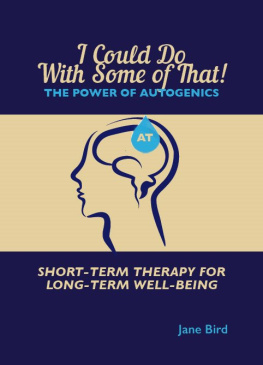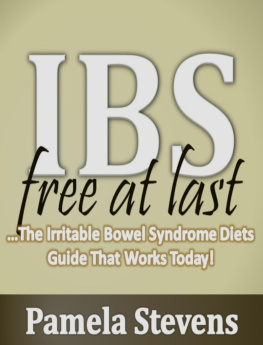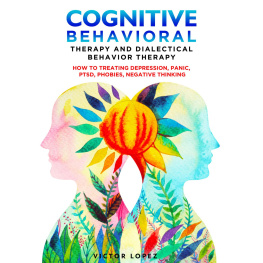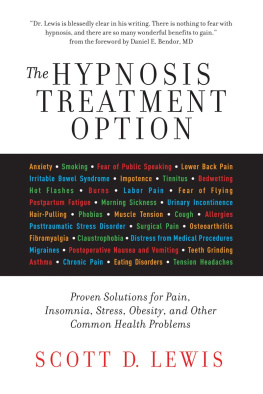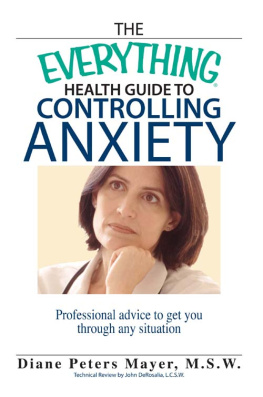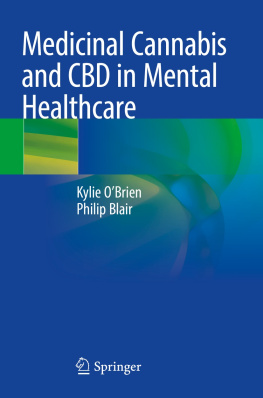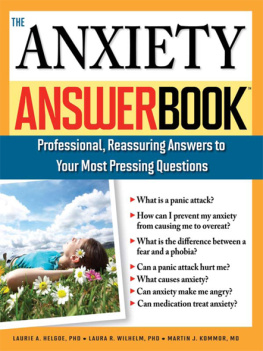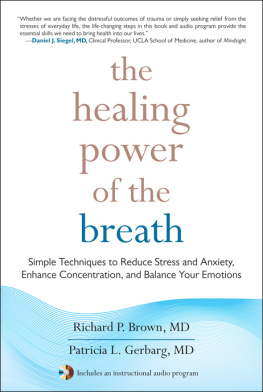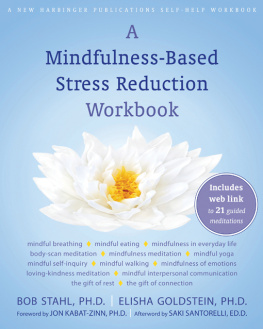
Published by
Legends Publishing
E-mail
Website www.legendspublishing.net
Copyright: Jane Bird, 2015
Author contact:
ISBN 978-1-906796-98-3
This book is a revision of the book Autogenic Therapy self-help for mind and body, by
Jane Bird and Christine Pinch, first published by Newleaf
(an imprint of Gill & MacMillan) 2002.
Disclaimer
This book is not an instruction book on the techniques of Autogenic Training. The intention of the author is to provide detailed information about Autogenic Training. In the event you use any of the information for yourself, the author and the publisher can assume no responsibility for the health of the reader or user.
Please note
Information herein is referenced where relevant. For any errors of omission or misrepresentation, the author takes responsibility, with apologies.
Notice of Rights
All rights reserved. Unless it is part of a published review, no part of this book may be reproduced or transmitted in any form or by any means, electronically or mechanical, including photocopying, recording, or by any other information storage and retrieval system, without prior written permission from the publisher. For information on getting permission for reprints and excerpts, contact the author.
Printed in EU by Pulsio SARL
Foreword
Twenty five centuries ago, the Greek physician Hippocrates composed a series of texts in which he tried to summarise a lifetime of experience for the benefit of his own students and their successors as yet unborn. Hippocrates was an astonishingly shrewd clinician, recognising, for example, that passing tarry black stools was an indication of internal bleeding. Mind you, he wasnt always right at least, I hope he wasnt as when he claimed It is wasting of the brain that leads to baldness. But most of the time he taught lessons which todays doctors would do well to remember, Cure sometimes, treat often, comfort always being one of them.
At the heart of Hippocrates philosophy was the belief that, by and large, problems sort themselves out if you dont interfere too much. Natural forces within us, he wrote, are the healers of disease. And for over two thousand years that humble observation ought to have constrained the worst excesses of pre-scientific medical practice. Treatments such as bloodletting for pneumonia or the flogging of lunatics, popular in their day, we now know did more harm than good.
But our accelerating reliance today on science and technology has led to an expectation that modern medicine can provide, at least in principle, a solution to every ill that besets a citizen of the twenty-first century world. Are you getting old? If we spend enough money on scanners and research, death can be indefinitely postponed. Stressed? Unhappy? Swallow the right chemicals, and peace of mind can be assured.
Enough people realise that this is at best an empty promise and at worst a nightmare vision for there to have arisen, in parallel with conventional medicine, an arm of the health industry patronisingly referred to as alternative or complementary medicine. Where orthodox medicine seems arrogantly to boast that science will make you well, the alternative camp often uses beguiling terms such as holistic, wellness or organic to imply that unconventional approaches are somehow more aligned with the natural order and therefore preferable. This disconnect between science-based and complementary approaches to healing has widened to the point where there are serious hostilities between the two sides, each finding it hard to acknowledge much merit in the other. Conventional medicine often downplays or dismisses the influence of mind on body, despite the undeniable therapeutic effects of the placebo response, hypnosis, meditation, relaxation and autosuggestion. Complementary practitioners in turn can be reluctant to accept that the scientific method based on the gathering and testing of evidence is a good way of telling what works from what does not, and too seldom submit their claims to scientific scrutiny.
What is clear is that, in our increasing dependence on high-tech solutions to illness and distress, something important has been lost sight of. But what? The something missing from how we care for ourselves is just that caring for ourselves. The natural forces within us known to Hippocrates are crowded out when we rely too much on other people to do our healing for us. Yet our stressed and over-loaded bodies and minds still retain their innate ability, given the right conditions, to recover from damage and malfunction. Not from every wound or disease, of course, but certainly from many of the illnesses and unhappinesses that so beset us in todays fast-moving and emotionally pressured world.
So what are the right conditions for this intrinsic self-healing to occur? In a nutshell, they are the relaxed physical state and self-accepting mind-set which Autogenic Training (AT) will teach you to enter at will. When you have read this book, you will understand. More importantly, when you have learned autogenics with a trained therapist and practise it regularly, you will know: not just know in your head but really, deeply, know in your body.
Does that sound a bit mystical? It truly isnt; heres an analogy. Suppose, in the kitchen grating some cheese, you forget to concentrate on what youre doing and catch one of your fingers on the grater and make it bleed. How will that small but painful injury heal? Youll rinse the wound, put some antiseptic on so it doesnt get infected, and cover it with a plaster. And youll remember to pay more attention when handling the grater in future. After that, provided you dont pick at the scab, nature will do the healing, because thats the way the body works. AT is the equivalent, on a larger scale, of cleansing and disinfecting lifes traumas, giving them a chance to heal and gently teaching you to care better for yourself in the long run.
Autogenic Training has been around now for the best part of a hundred years, and during that time the experience of countless people (myself included) bears testimony to its effectiveness. It would be wrong to say that it bridges the gap between mind and body, or between orthodox and complementary therapies; when you practise AT you will come to see that there is not and never has been any such gap at all.
Jane Bird is the ideal person to introduce you to AT. Her background as a senior nurse means that she is securely grounded in how peoples bodies and minds work. There is also a warmth and compassion in her writing that completely reflects the reality of Jane the person, whom I have known as a friend for more years than either of us cares to remember. She is her book is Autogenic Training is utterly deserving of your trust.
Dr Roger Neighbour
OBE DSc MA FRCGP FRACGP FRCP
Bedmond, Hertfordshire
December 2014
Acknowledgements
The first version of this book: Autogenic Therapy self-help for mind and body, which I co-authored with Christine Pinch, was published in 2002. So of course my first acknowledgement is to Chris, whose unfailing friendship and energy brought about that first offering, and with whose permission and encouragement, since her retirement, I have been enabled to go it alone this time.
No book of this type can ever be written without extending huge thanks to the many people I have had the pleasure to work with: clients, colleagues and students. I am grateful to have been presented with abundant opportunities for exploration and debate over many years. When working consistently with a creative and vibrant group of people, it is often difficult to pinpoint the origin of an idea or concept. Many ideas have rubbed off as I seek to improve my own autogenic practice with clients and with the BAS professional therapist training.
Next page
